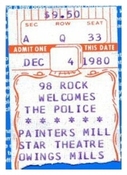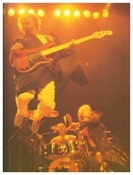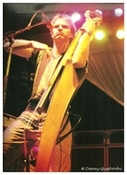
Zenyatta Mondatta
Rock's adventurous globe-trotters...
Sting (aka Gordon Sumner - the bassist, lead singer and principal songwriter of the Police? put it best.
"We're definitely not orthodox," he said of the three-piece reggae/rock group that also includes guitarist Andy Summers and drummer Stewart Copeland. "And we seem to thrive on that unorthodoxy."
Indeed they do. Having undertaken a world tour earlier this year that included such unlikely rock venues as Bangkok and Bombay, the group's third album Zenyatta Mondatta, is rapidly climbing to the upper reaches of the record charts.
The group was at Painters Mill Star Theatre Thursday night as part of a North American tour that has already seen the group range as far and wide as Quebec and Mexico City, furthering its reputation as rock and roll's most adventurous globe-trotters.
And for an hour and a half - from the opening Number Don't Stand So Close To Me, which also opens its latest album, to the closing one, an extended version of Roxanne, its first big hit, and on through an encore that had the crowd on its feet and chanting for more - it managed to turn Maryland into, well, a Police state.
The Police showed the flair and facility for incorporating the syncopated Jamaican rhythms into Anglo-American rock songs that has become its trademark. But it also showed much more an ability to pound out straight-ahead power-pop and an effusive sense of showmanship.
Sting, whose muscular body was clad in a sleeveless t-shirt, was the focal point of the band, whether he was prancing about on stage like a blond-maned stallion or taking long spotlighted solos that reached near-hypnotic levels, while guitarist Summers and drummer Copeland offered solid, and at times inspired, support.
"I think we're playing better now than we've ever played," Summers offered backstage after the show. "We've improved together. Where we first began to come together was on our first American tour. Before that, we had played maybe 12 gigs. But on that tour, we were playing two gigs a night. And we learned a lot of things, like how to be spontaneous, that you can't learn out of a book."
That tour was in 1978, a year after the American-born Copeland formed the Police in England with Sting, a Briton, and a guitarist named Henri Padovani, whom Summers soon replaced.
From the beginning, the Police were decidedly and determinedly different. After the release of Roxanne, a man's poignant plea to a woman not to become a prostitute, but before their first LP, Outlandos d'Amour, was readied, the Police took a bargain flight to the United States and began a tour of small East Coast clubs.
"It was just the three of us and our road manager," Summers recalled. "It was great. I guess we've always had a kind of pioneering spirit."
The tour earlier this year that brought them to the Middle, Near and Far East was undertaken with the same sense of adventure - and enthusiasm.
"We didn't do it to ship units, because we didn't have records out in any of those countries," Summers said of the decision to undertake a tour that included stops in Egypt and Japan as well as Thailand and India. "We just felt we had to break ground."
"It was quiet an emotional experience. It made you see life in a way you've never seen it before. It was just totally different from the West. In Bombay there were people walking the streets without arms and legs. It's great to go out and play before people of a different culture, or with a different shape to their eyes. It was a great experience, the fact that we were the first rock group to play in Bombay.
"We put on the full show, like we did tonight. And in the end, we got a real rock and roll response. Obviously, music is a universal medium. It's a common language and there are elements in it that appeal to everyone."
That the trip made sharp impression on the Police is apparent from many of the songs on Zenyatta Mondatta, most notably the LP's second cut, Driven to Tears. The song postulates individual powerlessness in the face of human suffering, declaring "Too many cameras and not enough food / This is what we've seen" and concluding "Protest is futile / Nothing seems to get through / What's to become of our world / No one knows what to do."
"Having gone out into the world and seen mutilated children, you can't help but be affected," Sting said. "That song is a cry of futility."
Asked if he had plans of offering any solutions to his trenchant statement of the problem on future songs, he said, "In a way, the song that follows on the album (When the World is Running Down, You Make the Best of What's Still Around) can be taken as one answer. But, really, that song is about loneliness."
In addition to broadening their perspective on the world, The Police feel their earlier tour and some stops on their current tour have helped them keep their perspective on themselves.
"When you tour Britain, Europe and America," Sting said, "what you're actually doing is reinforcing yourself. You can burp on stage and people will applaud. But if you go where people have never heard a rock group, you're starting from scratch."
He added: "In the past, if we big in America and big in Europe, we would think, 'We've taken the world.' Groups like Styx, Yes and Led Zeppelin (three big name mainstream rock groups) don't know that. They haven't even thought of it."
The Police have thought of that - as well as were they are going to end up.
Sting, for example, is aware that the character of a lot of groups change when they reach the level of success the Police have achieved.
(c) The Baltimore Sun by Eric Siegel




